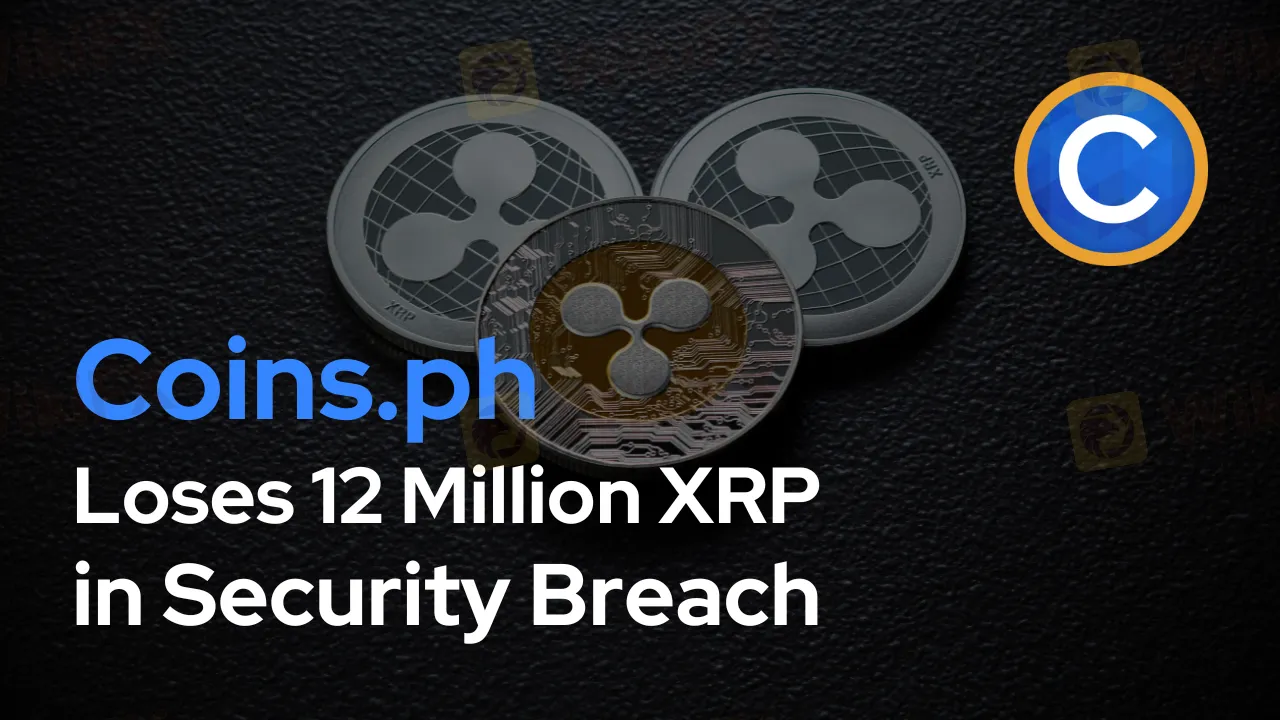简体中文
繁體中文
English
Pусский
日本語
ภาษาไทย
Tiếng Việt
Bahasa Indonesia
Español
हिन्दी
Filippiiniläinen
Français
Deutsch
Português
Türkçe
한국어
العربية
Coins.ph Loses 12 Million XRP in Security Breach
Abstract:Breaking news: Coins.ph, a leading Philippines-based crypto exchange, suffers a significant security breach leading to a loss of over 12 million XRP valued at around $6 million. Read for details on how the hack unfolded, the role of various exchanges in the laundering process, and the immediate actions taken.

Coins.ph, a large cryptocurrency exchange situated in the Philippines, has purportedly been the target of a possible security vulnerability. According to a report by crypto news site The Block, the event resulted in the loss of over 12 million Ripple (XRP) coins, which are believed to be worth over $6 million.
Timeline of the Security Breach
The event unfolded rapidly, within a span of approximately 30 minutes. An unidentified entity, suspected to be a hacker, managed to move large amounts of XRP in multiple transactions. Blockchain explorer XRP scan revealed that the supposed hacker executed thirteen transactions of 999,999.999 XRP each, along with an additional 200,000 XRP transactions.

Interestingly, it seems that one transaction failed to complete successfully, although the details are still under wraps.

The Trail of the Stolen XRP
After acquiring nearly 12.2 million XRP tokens, the assailant went ahead to launder these coins. They utilized a series of exchanges including OKX, European-based WhiteBIT, OrbitBridge, SimpleSwap, ChangeNOW, and Fixed Float among other platforms.

Exchange's Response
While Coins.ph has not yet issued a public statement, WhiteBIT, one of the exchanges involved, has taken proactive steps. A spokesperson from WhiteBIT stated that upon receiving a request from Coins.ph, they promptly blocked 445,000 Ripple. The exchange has also collaborated with security firms Cristal and Chainalysis to flag addresses linked to the stolen cryptocurrencies.
Public Reaction and Other Events
Coincidentally, Coins.ph had recently taken part in the DEVCON Pro Summit 2023, a notable crypto event held in Whitespace Makati Philippines. In light of the incident, the exchange has faced scrutiny from its users on social media. Although Coins.ph has yet to respond publicly, they did manage to address a comment made by a user on their official Facebook page concerning the issue.


As the crypto community reels from this shocking development, further updates are awaited from Coins.ph and involved parties. This incident underscores the need for robust security measures in the fast-growing but volatile world of cryptocurrencies.
Conclusion
This event serves as a clear reminder of the vulnerabilities that exist in the crypto field. As digital assets gain significance, the risks rise, and the need for enhanced security becomes more pressing than ever.

Disclaimer:
The views in this article only represent the author's personal views, and do not constitute investment advice on this platform. This platform does not guarantee the accuracy, completeness and timeliness of the information in the article, and will not be liable for any loss caused by the use of or reliance on the information in the article.
Read more

The Top 5 Hidden Dangers of AI in Forex and Crypto Trading
Discover the top 5 hidden dangers of AI in forex and crypto trading: over-reliance, market manipulation, predictive failures, ethical issues, and volatility risks.

Pepperstone Adds 79 Stocks to 24-Hour US Share CFDs
Pepperstone expands 24-hour US share CFDs, adding 79 stocks like Tesla and Nvidia, meeting demand for after-hours trading opportunities.

Scam Couple behind NECCORPO Arrested by Thai Authorities
Thai authorities have dismantled a cryptocurrency investment fraud syndicate, arresting a Chinese national and a Thai woman linked to a multi-million baht money laundering operation. The pair, who led an extravagant lifestyle funded by illicit activities, have been connected to 28 separate fraud cases, with total financial damages exceeding 30 million baht.

Unmasking the ‘Datuk’: The Anatomy of a RM638,205 Investment Scam
Authorities in Malaysia have launched an extensive investigation into a fraudulent stock investment scheme, which has resulted in losses amounting to RM638,205.
WikiFX Broker
Latest News
Brazilian Man Charged in $290 Million Crypto Ponzi Scheme Affecting 126,000 Investors
Become a Full-Time FX Trader in 6 Simple Steps
ATFX Enhances Trading Platform with BlackArrow Integration
Decade-Long FX Scheme Unravels: Victims Lose Over RM48 Mil
The Top 5 Hidden Dangers of AI in Forex and Crypto Trading
IG 2025 Most Comprehensive Review
Construction Datuk Director Loses RM26.6 Mil to UVKXE Crypto Scam
SEC Drops Coinbase Lawsuit, Signals Crypto Policy Shift
Should You Choose Rock-West or Avoid it?
Scam Couple behind NECCORPO Arrested by Thai Authorities
Currency Calculator






